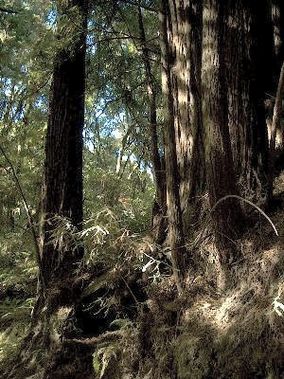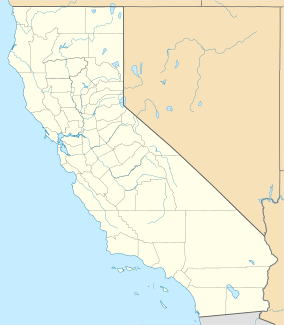The Forest of Nisene Marks State Park facts for kids
Quick facts for kids The Forest of Nisene Marks State Park |
|
|---|---|
|
IUCN Category V (Protected Landscape/Seascape)
|
|

Redwood trees in the Forest of Nisene Marks
|
|
| Location | Santa Cruz, California, USA |
| Nearest city | Aptos, California |
| Area | 10,223 acres (41.37 km2) |
| Governing body | California Department of Parks and Recreation |
The Forest of Nisene Marks State Park is a state park of California, USA, protecting a secondary forest in the Santa Cruz Mountains. It is located outside Aptos, California and contains over 40 miles (64 km) of hiking trails and fire roads through 10,223 acres (4,137 ha) of variable terrain.
History
The park was named after Nisene Marks, a passionate nature lover and the mother of a Salinas farming family that purchased the land from lumber companies (and others) in the hopes of finding oil. After drilling efforts failed to find any oil, Marks' children donated the original 9,700 acres (3,900 ha) of land in her memory to the state of California (with the help of the Nature Conservancy) in 1963.
The California State Parks department, with additional help from the Save the Redwoods League, expanded the park to 10,036 acres (4,061 ha). The park is on land that was clearcut during a forty-year period of logging (1883–1923) by the Loma Prieta Lumber Company. Evidence of logging operations, mill sites and trestles is visible in the park. The park offers rugged semi-wilderness, rising from sea level to steep coastal mountains of more than 2,600 feet (790 m). The park is a popular spot for running, hiking and horseback riding. Mountain biking is restricted to the fire road as of 2004 because of deed restrictions regarding the state park.
The epicenter of the Loma Prieta earthquake on October 17, 1989 was in this park. The quake's epicenter and Five Finger Falls are the two most popular attractions in the park.
Natural history
Four-fifths of the park is covered in dense redwood forest. Chaparral is found on a few of the hotter, steeper ridges. Douglas firs grow among redwoods in a number of areas. Other trees species include: alders, maples, and cottonwoods near creeks; tanoaks in the understory of redwoods; and Pacific madrone, California bay, and several oak species.
 | John T. Biggers |
 | Thomas Blackshear |
 | Mark Bradford |
 | Beverly Buchanan |



